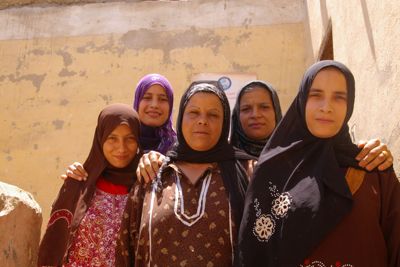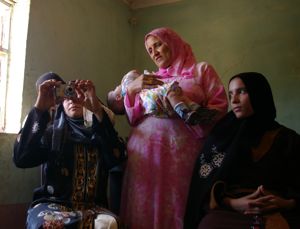The large city of Cairo is usually cooler in the mornings, so Rising Voices started its visit to the Minya Governorate, which is located 247 km south of Cairo) in the early morning hours. I was accompanied by Nevine Ebeid, the project lead of the Women of Minya Day by Day citizen media project, one of the three Rising Voices projects in Egypt, and Eddie Avila from Rising Voices. The purpose of our travel was to meet the participants of the project and to finalize details with the host NGO.
This was my first visit to Minya, even though my father is originally from Upper Egypt. Minya is often known as the “Bride of Upper Egypt” and a statue of Queen Nefertiti is prominent in the city's entrance. It is the only governorate which has a woman as a symbol, but Nevine replied that “it does not symbolize the well-being of women here.” Upon arrival, it appeared to be that the governorate seemed to be neglected, as it has been one of the poorest areas in the country over the last 15 years according to Human Development reports. The percentage of the population that is illiterate is 67% Some of the comments and statistics would provide the context of some of the stories that we heard from the young women that we met.
Harsh Working Conditions
Our destination was a village called Dawadeyya and we knew we were arriving soon when we spotted Minya Mountain. It's known for being a source of marble, and where local workers spend around 16 hours a day breaking rocks and preparing them for manufacturing. Unfortunately about a quarter of the quarry workers in Minya are minors. Working on the mountain also poses serious health problems, such as lung, vision, skin, and some have even lost a limb from the machines that use a very high voltage of electricity. However, it is not only men and children who work in the quarry because women also can be found collecting rocks under the hot sun.
In Dawadeyya, we were received by three nice women who are representatives from the high board of the Ben El-Reef (Daughter of Countryside) Society, the organization that the New Woman Foundation will be partnering with to teach the citizen media project. All three were wearing the traditional Abaya and a hair scarf, even the male accountant working with them, was dressed in a Jellabiya. They do not wear formal attire because they are able to better relate to the community that they serve, when they dress with local customs. This is especially important since the women often visit other women in their homes to talk about family issues or reproductive health issues.
We met some of the young women who will participate in the program. Approximately eight entered the modest office of Bent El-Reef, with big smiles on their faces. The head of the organization explained why they were smiling, “they are very happy to have visitors in Dawadeyya.”
Hearing the Stories of the Young Women
The first young woman introduced herself as Shimaa, the oldest sister of four brothers. She is responsible of helping her mother in making a living since her father passed away some years ago. “I first worked in construction, I used to carry blocks and sandbags on top of my head from 7 a.m. to 6 p.m.,” she would say with self-confidence and with a smile. “But I was only paid 4 or 5 pounds a day” (equivalent to approximately to 1 $US), while men who did the same job were paid triple. “Now I am farming and take the harvest to the market myself,” she added and revealed that she did all this while attending evening school to learn how to read and write.
The next girl, Aya was still in high school. She said, “sometimes I don't attend school in order to work, otherwise, I would not even the tuition fees.” Even though she received good grades in middle school, her father wanted her to drop out of school because he did not want to pay for anything. She spoke honestly and angrily about how her father treated her and her four sisters, as if they were like “animals”. However, she is eager to learn and thinks that others should learn about how some people live in her village.
After hearing some of these stories, I joked, “women here are as tough as men!” and everyone laughed except for Huda who looked sad. She introduced herself briefly, “I'm Huda. I do not work, but I want to learn how to use the internet.” However, she also thought that she was not as impressive to the visitors as compared to the others because she said she only does household chores for her three brothers and her aging father, while her mother works.
Citizen Media to Tell Their Stories
These stories remind us that women in Upper Egypt often work equally as hard as men and in equally harsh conditions, but are paid less. Yet, when the work is over and men can lay down to relax, the work for the women does not end. There are household chores that need attending to. In the village of Dawadeyya, baking is a common chore for the women. They often spend 10 hours or more baking for her family and the neighbors, and also to sell. A traditional mud oven can be found inside the house, but it is unhealthy for the woman and her children because of the fumes. With funding from the UNDP, Bent El-Reef developed an oven equipped with an air exhaust pipe and a sliding door to prevent carbon monoxide from coming into the house. With more of these ovens in the community, women and her daughters can earn a living by selling gas for the oven.
However, this visit to Minya helped laid the foundation for the citizen media project Women of Minya Day by Day, where stories from girls like Shimaa, Aya, and Huda can come to light. To give them a taste of what they can expect in the workshops, all three of us handed them our cameras so that they can feel what it is like to hold a camera. We invited them to snap a photo of us. They did so with large smiles on their faces and eagerly asked when the workshops would start because they want to take photos of their mothers, farm, and the rest of their village.





